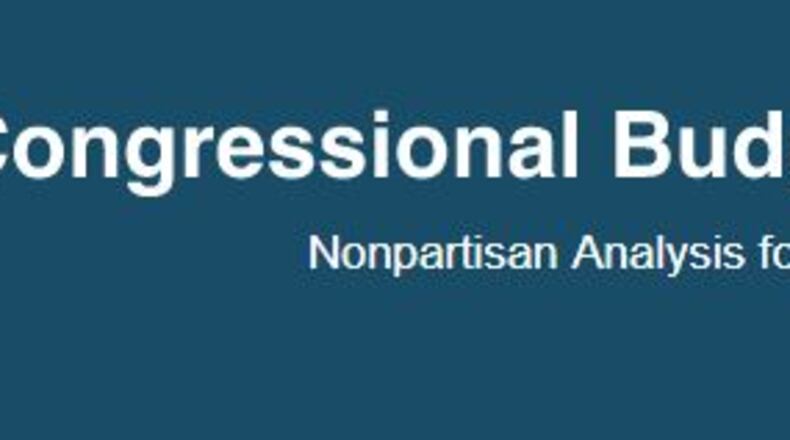In that budget, Mr. Trump's team predicted it would show a $16 billion surplus in 2027, balancing the federal budget in ten years.
The CBO found something much different, that the Trump budget would show - not a surplus in 2027 - but a $720 billion deficit that year.
It didn't take long for the social media barbs to rain down on me.
"Why do you give the CBO any credibility?!" one person wrote.
"Since when has the CBO been right about anything?" another added on Twitter.
"Because the CBO was so right about Obamacare," read one comment.
But even the White House has said nice things about the work of the Congressional Budget Office - along with the Joint Committee on Taxation - which slogs through all sorts of budget reviews of bills in the Congress, how they would impact Congressional spending and overall federal revenues.
For example - this was from late June at the White House:
So, let's look at CBO budget projections in recent years, and whether or not they have come close to predicting the correct level of budget deficits.
1. CBO budget review from March 2010. In the CBO review of President Barack Obama's budget plan for Fiscal Year 2011, the CBO made the following budget deficit projections - the first figure is the CBO deficit estimate, the figure in parentheses is what the deficit actually was that year.
2010 - $1.5 trillion ($1.294 trillion)
2011 - $1.34 trillion ($1.300 trillion)
2012 - $914 billion ($1.087 trillion)
2013 - $747 billion ($680 billion)
2014 - $724 billion ($483 billion)
2015 - $793 billion ($438 billion)
2016 - $894 billion ($585 billion)
In this 2010 review, the CBO was almost exactly right on the 2011 deficit, too low on the actual 2012 shortfall, and then estimated a deficit that was too high in years after that.
2. CBO budget review from early 2011.
2011 - $1.425 trillion ($1.300 trillion)
2012 - $1.164 trillion ($1.087 trillion)
2013 - $901 billion ($680 billion)
2014 - $764 billion ($483 billion)
2015 - $748 billion ($438 billion)
2016 - $841 billion ($585 billion)
2017 - $870 billion
In the 2011 estimate, the CBO was close in 2012, but well above the actual deficit figures for the next four years.
3. CBO budget review from early 2012.
2012 - $1.253 trillion ($1.087 trillion)
2013 - $977 billion ($680 billion)
2014 - $702 billion ($483 billion)
2015 - $539 billion ($438 billion)
2016 - $529 billion ($585 billion)
2017 - $488 billion
2018 - $510 billion
After being too high on deficit estimates, the CBO numbers got closer by 2015 from this 2012 projection, and then underestimated the deficit in 2016.
4. CBO budget review from early 2013.
2013 - $669 billion ($680 billion)
2014 - $675 billion ($483 billion)
2015 - $437 billion ($438 billion)
2016 - $413 billion ($585 billion)
2017 - $399 billion
2018 - $427 billion
In the first few projections we looked at, the CBO was often too pessimistic about the deficit. The 2013 estimate did the same for 2014, nailed the deficit almost to the dollar figure in 2015, and then underestimated the deficit for 2016 (and likely 2017 and 2018 as well).
5. CBO budget review from early 2014.
2014 - $506 billion ($483 billion)
2015 - $509 billion ($438 billion)
2016 - $548 billion ($585 billion)
2017 - $539 billion
2018 - $551 billion
2019 - $648 billion
CBO wasn't far off with their 2014 budget deficit predictions, going over but fairly close in 2014 and 2015, and then under in 2016. Their 2017 number will probably turn out to be too low as well.
6. CBO budget review from early 2015.
2015 - $486 billion ($438 billion)
2016 - $380 billion ($585 billion)
2017 - $401 billion
2018 - $435 billion
2019 - $511 billion
2020 - $574 billion
The 2015 review was fairly close in that fiscal year, but then continues the CBO's recent projections that were too rosy - 2016's deficit estimate was too low, and 2017 will be as well.
7. CBO budget review from early 2016.
2016 - $529 billion ($585 billion)
2017 - $433 billion
2018 - $383 billion
2019 - $518 billion
2020 - $585 billion
2021 - $651 billion
The deficit turned out to be worse than expected for 2016 in this projection, and the 2017 (and maybe 2018) figures also look to be too low in terms of the deficit.
8. CBO budget review from May 2017.
2017 - $693 billion
2018 - $593 billion
2019 - $689 billion
2020 - $664 billion
2021 - $692 billion
2022 - $745 billion
This was the projection done on the first budget from President Donald Trump. The 2017 figure is along the lines of where the deficit is heading in the current fiscal year. Depending on what the Congress does - and how the economy responds, we'll see about the other figures.
Is the CBO right all the time? No. But they aren't dead wrong all the time either.
On Capitol Hill, they are regarded by many - along with the Joint Committee on Taxation - as a very effective group in estimating revenue and budget numbers.
Even the White House - which has been critical of CBO health insurance coverage estimates - has praised the work of the CBO on budget and revenue issues.
"CBO is strictly nonpartisan," it says on the agency website, touting "objective, impartial analysis," and stating that it "hires its employees solely on the basis of professional competence without regard to political affiliation."
About the Author


